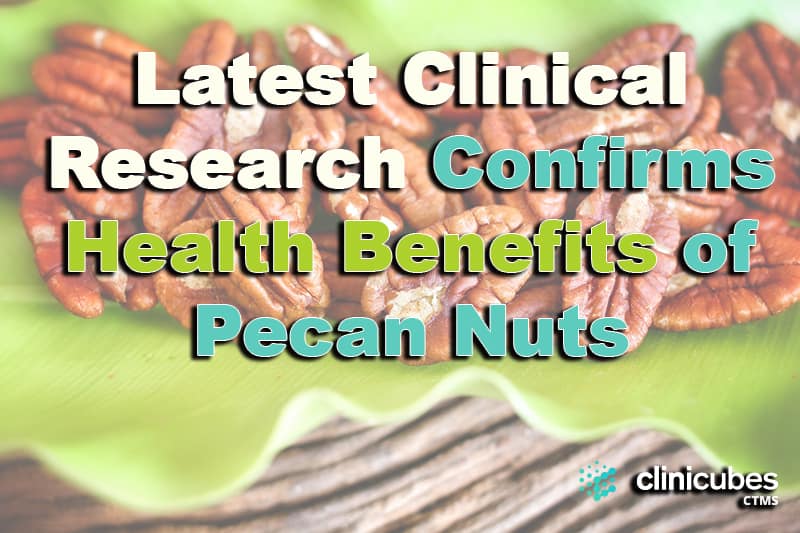Latest Clinical Research Confirms Health Benefits of Pecan Nuts

Latest clinical research news highlights that there are major health benefits of the bioeffects of pecan nuts. Not only this, but their constituents are also huge source of excellent dietary ingredients. The health-promoting effects have been finally confirmed by a joint group of scientists, who have gather together to summarize the reports examining the physiological effects of pecan nuts dietary intake. They also aimed at describing the positive health influence of their bioactive constituents.
The pecan tree belongs to the hickory family. Pecan nuts (Carya illinoinensis) are one of the most popular edible nuts native to Mexico and North America. They have high levels of monounsaturated fats. Precisely, over 70% – the highest among all the nuts.
Interestingly enough, despite of having that much fat, these nuts can reduce obesity. Moreover, dietary intake of lipids, precisely polyunsaturated and monounsaturated fatty acids, help in the battle against extra weight as well as in minimizing the occurrence of obesity. As a rich source of dietary fatty acids, pecans are also abundant in epigallocatechin-3-gallat. Standing under the abbreviation EGCG, this constituent is a polyphenol, that also happens to have a variety of health-beneficial qualities.
But what the scientists find and conclude with the body of evidence they had collected? First and foremost, besides being good for obesity management strategies, this valuable food can mitigate inflammation. It can actually reduce how much inflammatory mediator molecules are being synthesized by the body. In this sense, pecans are also great for those, who are mainly on the Western diet. The latter is associated with the overconsumption of saturated fatty acids, thus inducing pro-inflammatory effects.
The latest clinical research also finds that not only pecans, but nuts in general can reduce the risk of cardiovascular disease and metabolic disorders. In fact, diets rich in these types of foods modulate the blood level of cholesterol, adiposity, and insulin resistance, and therefore are great food ingredient for those combating diabetes and coronary heart disease.
In general, the available data indicates that pecan nuts exert health-promoting benefits similar to those of almonds and walnuts. The summary of available studies leads to finally bringing about greater understanding of the protective effects of diverse tree nuts on human physiology.
Publication:
“Pecan nuts: A review of reported bioactivities and health effects
Abstract
Background
Food choices represent a highly significant approach to combat human obesity. Dietary intake of lipids, especially polyunsaturated and monounsaturated fatty acids, is gaining popularity in the effort to reduce or eliminate the occurrence of obesity. Pecan (Carya illinoinensis) nuts are an abundant source of these dietary fatty acids. Moreover, they are a rich source of epigallocatechin-3-gallate (EGCG), a polyphenol with a variety of health-beneficial properties.
Scope and Approach
In this review, we summarize the literature reports examining physiological effects associated with pecan nuts consumption and described effects of their bioactive constituents.
Key Findings and Conclusions
The growing body of evidence suggests including pecan nuts into obesity management strategies. The consumption of pecan nuts can mitigate inflammation by reducing the extent of the synthesis of inflammatory mediator molecules. Pecan nuts can also counteract the pro-inflammatory effects of a diet rich in commonly overconsumed saturated fatty acids, characteristic of the Western diet. Additionally, consumption of pecans and other nuts has been linked to reduced risk of physiological parameters associated with cardiovascular disease or metabolic disorders. Diets enriched with tree nuts and peanuts can modulate the blood level of cholesterol, adiposity, and insulin resistance. Almonds and walnuts have been so far the most studied nuts, and studies with them have led to a greater understanding of the protective effects of diverse tree nuts on human physiology. In this review, we summarize the available data indicating that pecan nuts exert similar health-promoting benefits.”
Citation: Atanas G. Atanosova, Shefali M. Sabharanjak, Gokhan Zengind, Adriano Mollicae, Agnieszka Szostakaf, MarioSimirgiotis, Łukasz Huminieckia, Olaf K. Horbanczukh, Seyed Mohammad Nabavii, Andrei Mocanj
Meet the author:
Dr. Atanas G. Atanasov is a research scientist and principle investigator at Department of Pharmacognosy, Faculty of Life Sciences, University of Vienna, Austria. He has published over 50 peer-reviewed original research articles and reviews in the field of molecular medicine, mechanisms of pharmacological action, cell signaling, and regulatory mechanisms relevant for cardiometabolic disease and inflammation. Exploring innovative approaches for public research dissemination, he is also actively engaged in science communication in the social media.
Connect with Dr. Atanasov: LinkedIn, Twitter, Facebook
Our clinical trial management system, Clinicubes CTMS, offers integrated solutions for every single aspect and phase of clinical research. In its core, the software is systematized, well-built and easy-to-use. Clinicubes delivers easier way for collecting, retaining and archiving patient and scientific data. Clinical research professionals can take full advantage of the system to increase their team’s productivity and the number of successfully completed clinical tasks and trials.
You can find the PDF version of the blog here: Latest Clinical Research Proves Health Benefits of Pecan Nuts
Picture Source: georgiapecans.org




